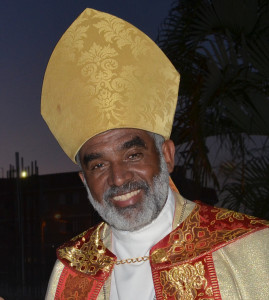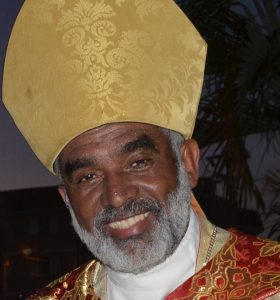Suffragan Bishop of Kingston & Canonical Administrator Diocese of Jamaica & The Cayman Islands
The God of Lost Sheep
SERMON Text: LUKE15:2 & 7
 “And the Pharisees and Scribes complained. ‘This man they said welcomes sinners and eats with them.’ …. “I tell you” said Jesus, ‘there will be more rejoicing in heaven over one repentant sinner than over ninety-nine virtuous ones who have no need of repentance’”.
“And the Pharisees and Scribes complained. ‘This man they said welcomes sinners and eats with them.’ …. “I tell you” said Jesus, ‘there will be more rejoicing in heaven over one repentant sinner than over ninety-nine virtuous ones who have no need of repentance’”.
In Luke’s Gospel Chapter 15, Jesus speaks to the experience of where our world is today. A world filled with people who are lost. He describes three situations in which precious possessions were lost–a lost sheep, a lost coin and a lost son. We’re going to focus on the first of these, the lost sheep.
“Suppose one of you has a hundred sheep and loses one of them. Does he not leave the ninety-nine in the open country and go after the lost sheep until he finds it? And when he finds it, he joyfully puts it on his shoulders and goes home. Then he calls his friends and neighbours together and says, ‘Rejoice with me; I have found my lost sheep.’ I tell you that in the same way there will be more rejoicing in heaven over one sinner who repents than over ninety-nine righteous persons who do not need to repent.”
The story tells of the length to which God will go to find us and bring us home. The emphasis is not on the things we do to find God, but on God’s initiative in finding us. God, Jesus is saying, is the God of the Lost. God notices when one tiny lamb wanders from the flock. And God is willing to take every kind of risk in bringing the lost lamb back home. That’s who God is. That’s how much God cares. One little lamb goes astray, and God is willing to leave all the nice and well-behaved lambs, who stayed at home, and go through the broken-down wire fences and the brambles until he finds that one lost lamb.
It’s a beautiful image that every Christian should cherish. Whether you’ve ever been lost or whether you have someone you love who is lost right now, it is great comfort that God cares about those who have gone astray. What a wonderful story for us to ponder on this Education Sunday. Every teacher knows something about the sacrifices it takes to rescue the wayward child.
The picture of God as a shepherd is an interesting one. It is at least as old as the twenty-third psalm, “The Lord is my shepherd . . .” Jesus makes use of the image several times.
It might sound quite strange to us, but God wants to find us as much as, if not more than, we want to find God. Yes! God needs you and me because as far as God is concerned, there are no outsiders. The God we meet in Luke Chapter 15 is not some Old Patriarch who expects his children to run to him, and apologize for their wayward behaviour and promise to do better. On the contrary, the picture we have is of a God who leaves the security of his home, ignoring his dignity by running towards the one who is lost. It is an image of a God who pays no heed to apologies and promises of change. His one interest is to bring his lost child to the table richly prepared for him – “For the Son of Man came to seek and to save the Lost.”
We may wish to pause at this point and ask, why this bias for and on behalf of the lost one? What about the ninety-nine who choose to live by the rules? What must now become of the flock when the Shepherd leaves them unattended to go in search for the one wayward sheep? Sheep are not the most intelligent of animals when it comes to taking care of themselves. In any event, it may seem downright unfair to the ninety-nine faithful ones that they should be left to fend for themselves.
We are not told why the one sheep became lost. I imagine there could be a number of reasons. Judging from the story of the Prodigal Son, one would be led to believe that the sheep got lost because it strayed from the flock. That is to say, away from the path set by the Shepherd. What if one became lost not because of the rough terrain? What if our lost-ness is not caused by the social conditions, or a physical handicap – but because of our own deliberate fault? What must the shepherd do? Must he follow us into the far country regardless?
Looked at from the standpoint of the ninety-nine, the action of the Shepherd will always be seen as excessively unfair. But it is not from that perspective that Jesus would like us to hear the story. In response to the question posed to him by the Pharisees and doctors of the law, Jesus told these stories. He told them, not by way of apologizing for his actions, but to make it clear that the primary activity of the Kingdom of God, is to search for the lost – and that is so, even when they have no one but themselves to blame for their lost-ness. Jesse Jackson puts it this way when a couple years ago he was asked to state his reasons for supporting the Gay and Lesbian people. He said: “You must really love people the most when they need it the most. People don’t need much love when they have got a tail wind blowing. They need love when they are facing head winds and cross winds.”
Every wise and discerning parent and teacher knows the extent to which special attention is needed for the slow learner. It is not that one child is more loved than the other. Neither is anyone more precious than the other, but love has a way of bending itself towards those in greatest need, and will, at times go to extraordinary lengths to express that bias. That may appear unreasonable if not unfair, but in the end, it is the only thing that will rescue the one who sees no way out. “It is not the healthy”, says Jesus, “who needs a physician, but the sick. I have not come to call the righteous, but sinners.”
Jesus maintains that the searching out of the lost (the member who has left the church for one reason or another, or the one who never belonged to the church in the first place, but who needs the saving grace of God) must be one of the primary activities of the Christian community. You and I who are baptized in the name of Jesus and know something of his nurturing grace, must become for the community, the rescuing shepherd.
There is nothing glamorous about this kind of activity. In fact, the life of a shepherd is filled with all kinds of challenges and risks. Quite apart from the physical risks involved in caring for the sheep and going in search of the lost, there is also the risk of failure.All three parables in Luke Chapter 15 – the lost sheep, lost coin and the lost son – all end on a happy note. There is rejoicing, because that which was lost has been found. We could easily be left with the impression that rescuing the perishing and the dying always leads to a happy ending. But, the painful and disappointing thing about mission and ministry is that the one found, often gets lost again. The extraordinary love and attention comes to nothing. The hours spent with the recovering addict seems a waste, for days after one tearful and penitent encounter after another, he returns to his former ways.
About a decade ago, while I was Rector of St Andrew Parish Church, I established a partnership between the Church and the then Government in a programme to rescue young boys from the dark and destructive culture of the streets. If you measure success as the world does, by the number of boys we were able to get off the streets and return to school or to gainful employment at any given time, the programme would be judged a failure. Just at the moment when we felt we were getting somewhere with a young man, he would get into some trouble with the law.
Teachers and those involved in mentoring the young need, therefore, to ask: would the shepherd in our text decide that because the sheep might one day run away and get lost, we should think twice about getting involved? That question would never arise, because shepherds are about rescuing. The shepherd’s very being is defined by what he does, rescuing the lost. The one who lays down his life for the sheep is not defined by one rescue attempt. Sheep have a tendency to do dumb things, to keep on making the same mistakes over and over again. That is why they require a shepherd. And it is precisely what the youth in our country need desperately today.
Christians rejoice in the message of the cross and the example of the Good Shepherd, not because all the problems of the world have been solved, not because all human pain and suffering have come to an end, and thousands of people have been converted and are now praising God. No! There is rejoicing in Heaven, and we are invited to join in, because one of God’s children who is lost has been rescued. We don’t know what he/she will do with that gift. They may yet go out and squander it again, but God rejoices nevertheless and so must we, for without that Grace reaching out to the lost, the world and all of us will be encircled in a web of despair. But, thank God we do not have to, because we have a Good Shepherd who knows his own.

